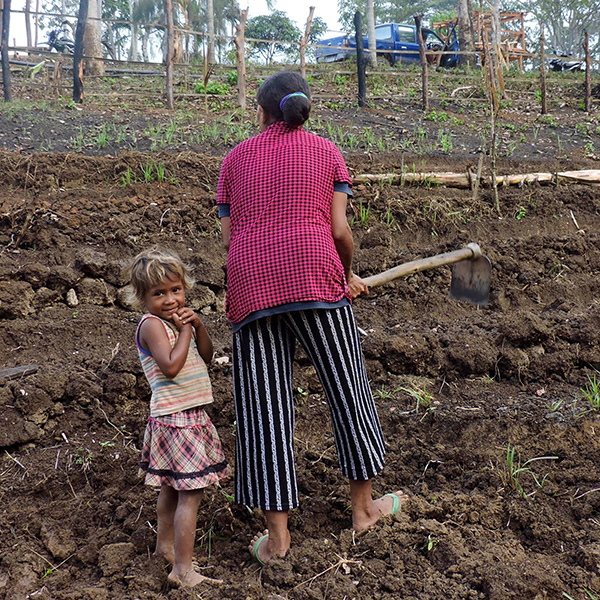Stories of Change

Beatrice is helping out while a neighbor works the garden along with Beatrice's mom Juliana (not pictured).
New information and farming practices take hold in Timor-Leste
A little over 20 miles from Dili, Timor-Leste, up a winding dirt road lined with banana trees, lives a uniquely blonde-haired 5-year-old girl named Beatrice.
Beatrice enjoys playing with her older siblings and cousins and following her mother around the house, “helping” with chores. Juliana da Silva Gonçalves, Beatrice’s mother, is a fairly typical Lebucaileti village mother and housewife, which means that she works really hard to help her husband earn a meager living and raise healthy children despite having very limited income-earning opportunities in a very poor place.
Because Juliana’s profile is a common one, CWS is expanding Timor Zero Hunger to rural Timor-Leste with a focus on activities that support modern farming practices – starting with ones that save water and use natural ingredients for composting and pest control. Not too surprisingly, what Timor Zero Hunger has to offer, all of which has been tried and tested in West Timor, Indonesia, over the past few years, is all new to the farm families with whom CWS works in remote Timor-Leste villages. Equally unsurprising is how proud the small CWS program team is to be able to be of help, and hope, to some of their country’s people.
For example, an activity that Juliana joined was building a demonstration garden plot with other members of her agriculture group. In the process, group members learned how to build terraces, make compost and plant new vegetable varieties which, if successful, will be introduced to others in the community. “In the past, our only vegetables were mustard greens, kale and corn, and my family planted corn only. If we wanted to eat mustard or other vegetables, we bought from our neighbors. Now, I am excited to be part in this program to raise different kinds of vegetables for my family so Beatrice and my other children can have better nutrition once the new vegetables grow.” If she grows extra vegetables beyond her family’s needs, Juliana plans on selling them to her neighbors. “The road is still too bad for me to take them to the market, so I will just sell them to my community,” she says.
Besides vegetable seeds, CWS gives families who are prioritized to join Timor Zero Hunger activities, several chickens to further improve families’ nutrition. Recently Juliana’s chicken hatched seven chicks; and, once the flock grows and the individual chicks mature, Juliana can sell both eggs and chickens to help purchase basic needs, like soap, rice and oil. She says she plans to teach her children to raise chicks, and to be responsible to take care of their own chicks in the future.
